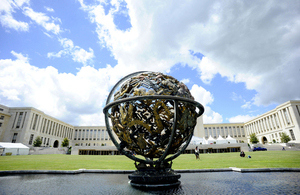Universal Periodic Review 27: UK Second Intervention
This UK statement was delivered at the adoption of the UK's Universal Periodic Review report during the 27th Session of the Universal Periodic Review on 21 September 2017.

The Universal Periodic Review takes place at the Palais des Nations in Geneva.
Mr President, Ambassadors, distinguished delegates, the UK Government remains fully committed to the UPR mechanism and to promoting human rights internationally. We continue to encourage all States to participate openly, willingly and honestly in their reviews – as the UK has done.
This UPR mechanism provides a process for States to share their experience in implementing a variety of policies, tackling similar problems and learning from each other.
In May, the UK Government listened with interest to views and recommendations from States on many issues, this included comments on the importance of ensuring the ongoing protection of equality and human rights as the UK leaves the EU, and a desire for the UK to strengthen its approach to international treaties.
As we have advised in our response, the UK Government will not repeal or replace the Human Rights Act while the process of leaving the EU is underway, and we will consider our human rights legal framework when that process concludes.
The UK Government’s stance on incorporation was also discussed in May and again today.
The UK is confident that it is fully complying with its UN treaty obligations. In the UK, UN human rights treaties have not been incorporated into domestic law, and they do not require State Parties to do so.
The UK has put in place a combination of policies and legislation to give effect to the UN human rights treaties that it has ratified. The same approach was followed by the British Overseas Territories and by the Crown Dependencies to which those treaties have been extended.
Other issues raised in May and today were, the impact of changes to welfare benefits and access to justice, particularly in relation to vulnerable people; and a desire to see continued monitoring of these changes. His Excellency Oliver Heald QC spoke in May on the policies in place to tackle poverty in England, Wales, Scotland and Northern Ireland.
We also heard views expressed around the importance of tackling modern slavery, which truly is a global challenge that requires a global response, and again, the Head of Delegation for the UK Government spoke in May on the work underway across England, Wales, Scotland and Northern Ireland to tackle human trafficking and modern slavery which is a major priority for my Government, both nationally and internationally.
In response to one intervention on 28 November 2016, the Working Group on Arbitrary Detention rejected our request for a review of its February 2016 opinion. We are very disappointed that they would not review their deeply flawed and incorrect position. Julian Assange is not, and has never been, arbitrarily detained in the UK. He is free to leave the Ecuadorean Embassy at any time but he will be subject to UK law.
I also note that there has been discussion around the number of recommendations that the UK has ‘supported’ or ‘noted’ - and I would say, ‘Noted’ does not mean rejected - I would suggest any statistical analysis or comparison data in relation to recommendations is approached with caution.
There is much information that lies behind the numbers, and I would encourage all those interested in human rights in the UK to read the extensive response provided by the UK Government.
Finally, I would like to thank all those who have spoken today and engaged in the UK’s Universal Periodic Review over the course of this year. I would, in particular, like to take a moment to thank the UK’s active civil society and National Human Rights Institutions for their contributions. The UK, of course, remains a strong advocate, promoting open societies and challenging threats to civil society.
I would also like to put on record the UK Government’s thanks to the Troika – Albania, Ethiopia and Mongolia - and the Human Rights Secretariat, for the professional way in which the UK’s review was conducted. We very much appreciate all the work which took place to ensure that proceedings ran smoothly. We look forward to meeting again for our fourth cycle of the UPR.